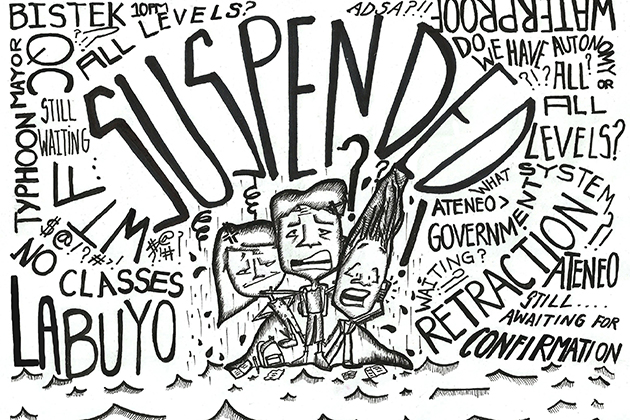Rainy nights, coupled with reports of inclement storms, are usually met by Ateneans clamoring for suspension of classes. When Quezon City Mayor Herbert M. Bautista announced that classes on all levels—including the collegiate level—were suspended, the news was not met with satisfaction.
Ateneans are used to waiting for an official announcement from the Loyola Schools administration. But the glaring question remains: Who is really in charge?
“Precautionary notice”
The events of Sunday night, August 11, caused quite a stir among Ateneans. At 10:00PM, Bautista announced on DZMM that there would be no classes on August 12, Monday. It took a little more than an hour for the suspension of classes to be confirmed by the Ateneo administration.
Scarcely 30 minutes later, rumors of the Ateneo administration retracting the suspension of classes were spreading. Associate Dean for Student Affairs Rene San Andres posted a status on his Facebook page: “We are currently verifying reports that the Quezon City government (Mayor Herbert Bautista) just corrected itself regarding suspension of classes tomorrow, August 12, that it is only for grade school and high school. Please wait for updates.”
However, the Quezon City government never did retract its announcement.
“It seems to me like students did not like the follow-up notice to await further updates. It was not a change of decision.” San Andres says. “It was a precautionary notice for people to wait for an update in the event that the conflicting reports were accurate.”
According to the Sanggunian Secretary-General AJ Elicaño, “It seems clear that much of the problem was from people sharing information before it was verified. This happened with the rumored retraction of the announcement as well, which caused even more confusion.”
Elicaño says that the different administration offices “seemed to be releasing information from different points in the decision process at different times.”
Information dissemination
The Sanggunian is also heavily dependent on the Ateneo administration when it comes to announcing suspension of classes. Elicaño says that the Sanggunian President is the officer with direct contact with the administration. The Secretary-General is in charge of communication lines.
Elicaño says that as soon as the Office of the Secretary-General or the Ateneo Student Concern Center (ASCC) team is informed of suspension of classes, they immediately release this information. The ASCC is in charge of the social media accounts of the Sanggunian. This information, Elicaño says, is “cascaded” through the Top 55 Sanggunian Officers, then the block and course representatives.
Joben Obdulio, ASCC head, says that, while Facebook and Twitter may be effective ways of spreading announcements of suspension, it would be practical to disseminate information through text. However, only registered Smart Communications users receive texts from the official Ateneo infoboard.
CHED Memorandum
CHED Memorandum Order (CMO) No. 15, series of 2012, states: “Classes at the collegiate level may be cancelled or suspended at the discretion of local chief executives of [Local Government Units] LGUs and/or heads of [Higher Education Institutions] HEIs if special circumstances in their area such as flooding, road damage, etc. warrant it.”
The CMO also states that classes in the tertiary level will be automatically suspended once the Philippine Atmospheric, Geophysical and Astronomical Services Administration (Pagasa) issues a Signal No. 3 Typhoon warning, or higher.
However, Associate Dean for Student Affairs Rene San Andres explains, “It is possible for a private tertiary educational institution, however, to make a decision different from that made by the LGU. In the event that the LGU decision is to suspend classes up to the collegiate level, a private tertiary level school may still decide to continue to hold classes, assuming that such was assessed as not detrimental to the safety and welfare of the students. The LGU decision covers more strictly public colleges and universities. It is assumed, of course, that the private school which decides to continue holding classes should at least notify the LGU regarding its decision since the LGU is still responsible for providing public services outside the campus of the school involved.”
With reports from David D. Garcia, Eugene G. Ong, Elijah V. Pascual and Roxie Y. Ramirez
UPDATED 11:00 AM, August 20, 2013.







